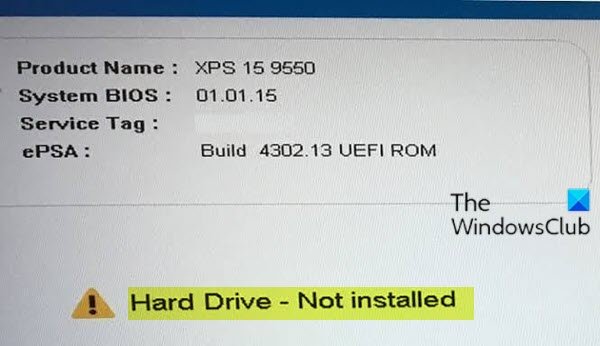As per user reports, you’re most likely to encounter this error on an HP, Lenovo, or a Dell computer. There are several reasons why your Dell computer reports no hard drive installed, detected or missing operating system error on startup:
Bad BIOS setting.A loose cable.A corrupted hard drive registry.A bad Windows installation.A boot sector virus.A broken hard drive.
Fix Hard Drive – Not installed error in Windows
If you’re faced with this Hard Drive Not installed problem on Windows 11/10, try this first:
Unplug the system and remove the base cover. Disconnect the battery and hard drive. Then hold the power button for 30 sec. Reconnect both and power up – check to see if the drive is recognized.If it’s not, and the system is under warranty – call Dell for a drive replacement.
However, if you wish to do a bit of troubleshooting yourself, you can try our recommended solutions below in no particular order and see if that helps to resolve the issue. Let’s take a look at the description of the process involved concerning each of the listed solutions.
1] Continuously press the F1 key
If your Dell computer shows the Hard Drive – Not installed error, you can press F1 to continue. It is a BIOS error message. Pressing F1 is a contingency procedure that can work around an error, and the computer may load into Windows correctly after pressing F1.
2] Check BIOS setting
BIOS handles the basic setup and boot process for the computer and prepares it to load the operating system. Hard drives are usually connected to onboard a SATA or IDE port. If the port that the hard drive is connected is disabled, the hard drive will not be detected by the computer and you will get Hard Drive – Not installed error message. In this case, you need to check or reset the BIOS setup and also ensure that the hard drive is on top of the list in the boot priority. Read: Hard Drive not showing up on Boot Menu.
3] Check hard drive cable
You may encounter this error if the computer isn’t physically connected to the hard drive. So you can check the hard drive cable to ensure whether it has a loose cable connection or the SATA cable and power cable may have worn out. If it is, you can reconnect the cables from both the hard drive and the MOBO, or replace the cable with a new one. Read: Windows 10 does not recognize second Hard Drive.
4] Perform PC hard reset
A hard or forced reset erases all information in the computer memory and might restore functionality. Resetting your computer forces the system to clear and reestablish the software connections between the BIOS and the hardware. Do the following:
Turn off the computer.Remove the computer from any port replicator or docking station.Disconnect all external devices from your computer, unplug the AC adapter from the computer.Remove the battery from the battery compartment.Press and hold down the Power button for about 15 seconds to drain any residual electrical charge from the capacitors that protect the memory.Insert the battery, and plug the AC adapter back into the computer, but do not connect any of the peripheral devices such as USB storage devices, external displays, printers, etc.Turn on the computer.If a start menu opens, select Start Windows Normally with arrow keys and hit Enter.
Read: External Hard Drive not showing up or detected.
5] Test the Hard Drive for physical damage
Remove the hard drive from the computer and connect it to another computer to see whether it still works. if it doesn’t, you should replace the hard drive with a new one. If it does, you can test the hard drive to see if it has bad sectors.
6] Perform a Windows Repair Install
A bad Windows installation may cause errors and prevent Windows from loading. Consequently, the Dell computer may show this error when booting. In this case, you can try running a repair installation to fix it. If Windows sees the hard drive when running a repair install, the drive is probably not broken. If the repair install doesn’t work, the drive may be infected with a boot sector virus, which you need to fix by formatting the hard drive.

